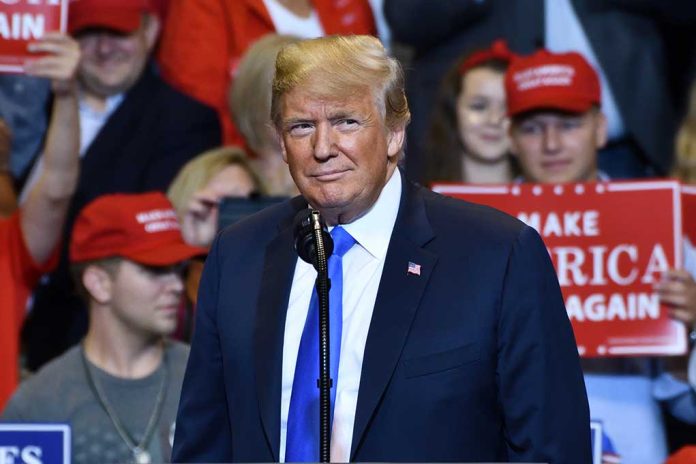
President Trump’s warm embrace of Pakistan’s top general has sparked alarm bells in New Delhi as a major realignment of South Asian geopolitics begins to take shape.
Key Takeaways
- President Trump hosted Pakistan’s army chief Field Marshal Asim Munir at the White House, signaling a dramatic improvement in US-Pakistan relations
- The cordial meeting has caused significant concern in India, which views itself as America’s more reliable regional partner
- Prime Minister Modi rejected Trump’s claims about mediating peace between India and Pakistan, creating potential diplomatic tension
- Pakistan’s cooperation on counter-terrorism efforts, including capturing an Islamic State operative, has enhanced its strategic value to the US
- Commercial opportunities in cryptocurrency and critical minerals may be driving factors in the renewed US engagement with Pakistan
Trump’s Strategic Pivot to Pakistan Alarms India
The diplomatic landscape of South Asia is undergoing a significant shift as President Trump extends an olive branch to Pakistan, much to India’s dismay. Field Marshal Asim Munir, Pakistan’s army chief, recently received a remarkably warm reception in Washington, complete with a White House lunch and meetings with top US national security officials. This cordial treatment marks a striking turnaround in US-Pakistan relations that had grown increasingly strained in recent years. The unmistakable thawing of relations comes at a time when India has been positioning itself as America’s preferred partner in the region, causing considerable unease in New Delhi.
President Trump’s personal engagement with Munir reflects his well-documented affinity for strong military leaders. The Pakistani delegation’s visit included discussions on critical regional security matters, counter-terrorism cooperation, and potential commercial ventures. Pakistan’s strategic significance has been underscored by its recent role in capturing an alleged planner of the Islamic State Khorasan Province connected to the devastating Abbey Gate bombing in Kabul. This cooperation on terrorism has evidently earned Pakistan renewed credibility with the Trump administration, despite India’s persistent concerns about Pakistan’s historical ties to terrorist organizations.
Trump Has a Pakistan Problem. India's Patience May Be Running Out
Donald Trump’s erratic handling of the India-Pakistan conflict — from ceasefire claims to bizarre boasts about averting nuclear war — reflect not just poor judgment but a lingering free pass to Pakistan's terror… pic.twitter.com/gooOYFma8V
— News18 (@CNNnews18) May 22, 2025
Modi Rebuffs Trump’s Mediation Claims
A brewing diplomatic tension has emerged as Prime Minister Narendra Modi publicly rejected President Trump’s assertions about mediating peace between India and Pakistan. Modi firmly stated that hostilities ended because Pakistan requested a ceasefire, not due to any American intervention. This contradiction highlights the delicate balance Trump must maintain between cultivating stronger ties with Pakistan while preserving the important strategic partnership with India. The Indian government’s skepticism toward Pakistan remains deeply entrenched, with officials in New Delhi viewing their neighbor’s counter-terrorism commitments with considerable suspicion.
The strategic calculus behind Trump’s outreach to Pakistan extends beyond counter-terrorism cooperation. Pakistan’s geographical proximity to Iran provides it with unique strategic value at a time of heightened Middle Eastern tensions. Though Pakistan’s room for maneuver regarding Iran is limited due to domestic public opinion, its position offers potential diplomatic channels that could prove valuable to American interests. Additionally, the Biden administration’s perceived neglect of Pakistan may have created an opportunity for Trump to distinguish his approach to regional diplomacy from his predecessor’s.
Economic Factors Driving the Realignment
Beyond geopolitical considerations, economic factors appear to be playing a significant role in the renewed US-Pakistan engagement. Pakistan has been actively seeking American investment in cryptocurrency exchanges and critical minerals – sectors that align with Trump’s economic priorities. The Pakistani delegation’s discussions in Washington reportedly included substantial focus on these commercial opportunities, suggesting that mutual economic interests are helping to bridge past differences. This business-oriented approach reflects President Trump’s consistent emphasis on beneficial economic relationships as a cornerstone of American foreign policy.
For India, the warming US-Pakistan relationship represents a potential challenge to its regional influence. Having positioned itself as a democratic counterweight to China in Asia, India has invested heavily in its relationship with the United States. The specter of increased American support for Pakistan threatens to complicate India’s security calculations, particularly regarding Kashmir and cross-border terrorism concerns. As President Trump navigates these complex regional dynamics, his administration must balance cultivating Pakistan as a valuable security partner while managing India’s legitimate apprehensions about Pakistan’s intentions and capabilities.



